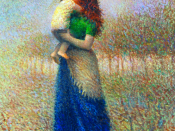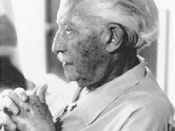Summary-Erikson
Erikson had a view of the personality within the psychosocial stages of development. He downplays a biological sexuality in favor of the psychosocial features of the conflict between child and parents. Since development extends throughout the life span and is divided into periods or stages, the amount of conflict in each stage determines whether the positive or negative pole is learned.
The first stage is the infant stage, which is considered from birth to one year. Here the child goes through a trust vs. mistrust crisis. Because the infant is so dependent on his mother, it is important for him to feel secure and trusting toward her. The goal is gain faith and trust in the mother; this is done through the act of hope.
Here it is important for the mother to be consistent and continuous in her actions; a baby needs familiarity. This will help the infant feel safe and secure and begin to trust the mother.
If the child does not gain this trust and leans more toward the mistrust side, the child will begin to become withdrawn and will detach from others.
Early childhood is the next stage, which is considered from ages two to three. The crisis faced in this stage is autonomy vs. shame and doubt. The goal is to achieve a degree of autonomy while minimizing the amounts of shame and guilt. The parents need to allow the child to explore so he will gain a sense of independence; a good sense of balance between being firm and being tolerant is what is needed at this stage. Through strong will and determination, the child will gain this autonomous way.
A little shame and guilt is beneficial to the child. Otherwise, an impulsivity and/or compulsion is created. Erikson used the term impulsivity...


